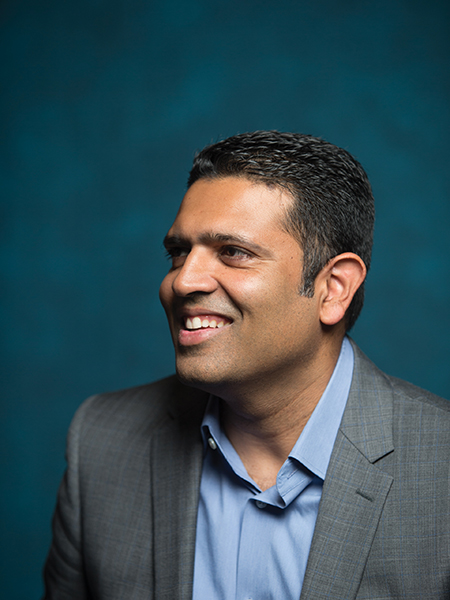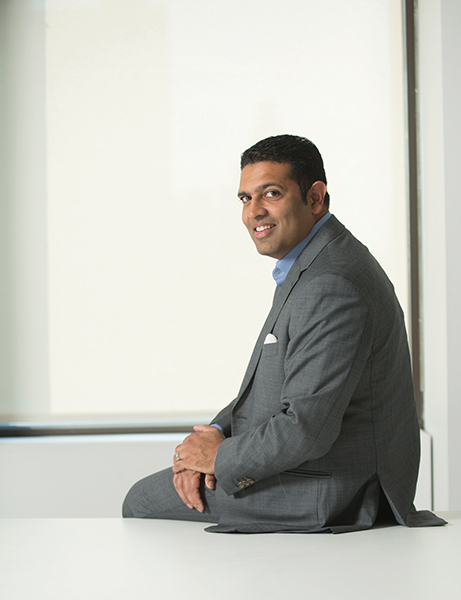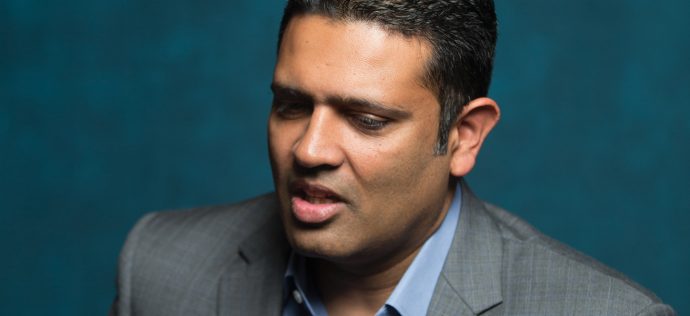Hari Sreenivasan signs off from the evening news in a way that other anchors don’t.
Instead of shuffling papers, he turns immediately to a laptop. His fear, he says, is that a story might be breaking as he’s going off the air.
“My piece of paper won’t tell me that,” he says. “My computer will.”
Sreenivasan is PBS’ tech guy. Besides his duties as anchor of “PBS NewsHour Weekend” and senior correspondent on its nightly newscast, he is host of “SciTech Now,” a weekly newsmagazine that is described as the “nexus of new ideas.” It gives Sreenivasan an unusual vantage point as a correspondent of the future.
“I think people want to know what the future is going to hold,” he says.
He pauses for — what else? — a work-related call on his cell. However, Sreenivasan’s is not an iPhone, which he dubs “the Mercedes of cell phones” — much less the new $1,000 iPhone X, with its face-recognition technology — but an Android, which is 67 percent of the worldwide market. (Still, Sreenivasan is an Apple as well as an Android kind of guy. He carries an iPad mini 4, which he calls “an elegant machine.” On the set, he uses a MacBook Air. Not putting all of his technological eggs in one basket appeals to this former philosophy student’s sense of diversification and democracy.)
Seated in a lime, gray and glass conference room in PBS flagship Thirteen/WNET’s offices at One Worldwide Plaza in Manhattan — itself a mix of traditional architecture and up-to-date technology (touch-screen elevators) — Sreenivasan speaks with the measured, well-modulated authority you expect of a top anchor. But there is also no denying the passion and excitement he feels for his beat. The rhythm of his articulate delivery quickens as he talks about tech’s future.

One aspect of it will be the electrification and automation of cars, which he says will have far-reaching consequences for everything from the oil industry and mass transit to the appeal of exurbia and the garage-centric home to the driving patterns of teenagers.
“The trend is that high school students get their driver’s licenses later, because mom or dad can give them a ride or they can Über,” Sreenivasan says. “I doubt there will be licenses in 15 years.”
That’s because teens and everyone else will be sleeping, working or probably texting in their self-driving cars.
In this, Sreenivasan sees China as the leader. Requiring 8 percent of cars to be electric, the People’s Republic intends to spend more than $360 billion on renewable energy through 2020, he says, adding, “They are turning out a solar farm the size of a football field every day, and that was two years ago.”
Sreenivasan is not unmindful of tech’s dark side. The recent security breach at credit reporting agency Equifax has exposed potentially every adult to identity theft. But such breaches could be avoided, he says, using the blockchain technology that underlies cryptocurrencies like bitcoin. (As of this writing, one bitcoin is worth $3,880.) A blockchain is a ledger that records a transaction between two parties without a middleman like a creditor.
“There are hundreds of thousands of computers constantly working to verify every transaction,” he says. “Once verified, they’re connected into blocks, meaning hacking any single transaction is near impossible because you’d have to have every transaction after it, while all those computers are watching and trying to catch an instance of fraud.”
Tech, then, is a bit like the Lord: It giveth and it taketh away. Sreenivasan points to GPS, which opened up a world of navigation for potential Über drivers but may have adversely affected mapmakers.
“Our biggest challenge is going to be how to fill people’s sense of purpose,” he says. “How do you feel you’ve contributed to society if the job that defined who you are is no longer there?”

Already technology is reshaping our sense of work and traditional education.
“Even now we no longer work for a company to get that Rolex in 40 years,” he says, adding that we may have to train and retrain for two or more careers.
And we may be doing more of that online. A recent PBS story focused on Georgia Tech’s online computer science master’s program, which costs a fraction of what completing a master’s on site would. Another installment considered how former miners in Appalachia are repurposing the land for the agricultural and food industries as they earn associate degrees at local community colleges.
Though the Mumbai-born Sreenivasan spent his early years in India, a country with a particular affinity for technology, it was his undergraduate years at the University of Puget Sound — from which he received a degree in mass communications while minoring in politics and philosophy — that turned him on to tech. Email was in its infancy then “and it was a lot easier than sending a letter with a postage stamp.” Soon he was setting up email accounts for classmates. (He’s still the IT guy for his Queens-based family.)
Sreenivasan’s tech savvy served him well during stints as a reporter for WNCN-TV in Raleigh, North Carolina, and CNET in San Francisco, which in turn led to anchoring and/or reporting duties at ABC News and CBS News.
There is one aspect of tech that worries him. Despite the facilitations made possible by FaceTime and Skype, he says, “the concern I have is the way it dehumanizes us. It’s one more way we’re not communicating face to face. What social skills are we using if we’re all on devices?”
As an experiment, Sreenivasan tried for a week not to look at his phone on the street.
“Have you ever watched people on the street? They’re all on their phones. It’s nuts. Not only are they not taking time to stop and smell the roses, they’re not stopping for the traffic.”
At the end of the day, the tech guy knows tech is just a tool.
“There’s an old saying in technology: ‘If you can’t see the product, you are the product.’”
Hari Sreenivasan hosts “On-Call: Health + Medicine,” a series exploring state-of-the-art health care solutions, advances in medicine and promising research, beginning Nov. 5 at 7:30 p.m. In each episode, he interviews leading physicians from NewYork-Presbyterian and other hospitals/medical institutions around the tristate region. The five episodes will cover lifesaving stroke information, adolescents and mental health, heart disease, PTSD and genomic and precision medicine. For more on Sreenivasan, visit pbs.org/newshour/ and scitechnow.org.





